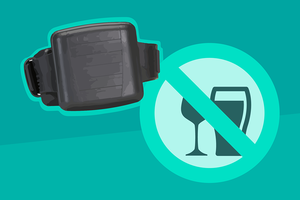Alcohol tags helping thousands of offenders stay sober
More than 97% of offenders on sobriety tags have stayed off alcohol, a year after they were introduced in England following a successful pilot in Wales.

- more than 3,100 criminals fitted with alcohol-monitoring tags in a year
- offenders stayed sober 97% of the time
- move to cut booze-fuelled crime which costs society £21 billion
Since the tags were launched as part of government plans to curb drink-fuelled crime, 3,121 offenders have been monitored by the tags, with more than 3,000 staying sober.
Alcohol plays a part in 39 per cent of all violent crime in the UK, and the social and economic cost of drink-related harm is estimated to be around £21.5 billion per year.
As a result of the scheme’s success, the Ministry of Justice will roll out alcohol-monitoring tags to other offenders once they are released from prison in the summer. Further details will be announced in the coming months.
By 2025 it is estimated that 12,000 offenders will have had their drinking monitored by the tags – part of the Government’s £183 million expansion of electronic monitoring.
Minister of State for Crime and Policing Kit Malthouse said:
We are ramping up our use of this innovative technology because it is working, with offenders staying sober 97 per cent of the time.
It is not only protecting the public from the scourge of alcohol-fuelled crime - it also gives probation officers the chance to work with offenders to help them turn their lives around.
Since last April, courts have been able to order offenders to wear an alcohol tag as part of a community sentence when their crime was driven by alcohol. The tag takes a sample of their sweat every 30 minutes and alerts the Probation Service if the offender has been drinking.
Those found breaking their ban can face a prison sentence and fines.
Roughly 20 per cent of offenders supervised by the Probation Service have an alcohol problem. The service provides professional support to offenders with an alcohol misuse issue, monitoring risk and helping them address their consumption while also linking them into specialist help.
Mark*, aged 44 from Hereford, was sentenced to a Community Order, and required to wear an alcohol-monitoring tag for 90 days after being arrested for drink driving. He has also been banned from the road for 30 months and received 100 hours Community Payback.
Mark said:
I was pulled over on a Saturday morning and was devastated to blow over the limit. Like many others, during lockdown a drink at the weekend had turned into maybe a glass of wine during the week and it made me reflect.
I’ve not found wearing the tag hard, but it has given me extra motivation to reduce my intake.
The government is investing £183 million into the expansion of electronic monitoring. As well as sobriety devices, GPS monitoring equipment is now deployed across 19 police force areas – roughly half of England and Wales - so that burglars, robbers and thieves that have served a prison sentence of a year or more are tagged on release. Their whereabouts will be monitored by GPS satellites for up to 12 months.
*Mark is not the offender’s real name.
Notes to editors
- The Alcohol Abstinence and Monitoring Requirement was launched a year ago in England following the successful launch in Wales in October 2020.
- Alcohol Monitoring on Licence was launched in Wales in November 2021 and will be rolled out to England this summer.
- The Crime Survey indicated that 39% of victims of serious offences believed that alcohol played a factor in the incident: click to read England’s survey and Wales.